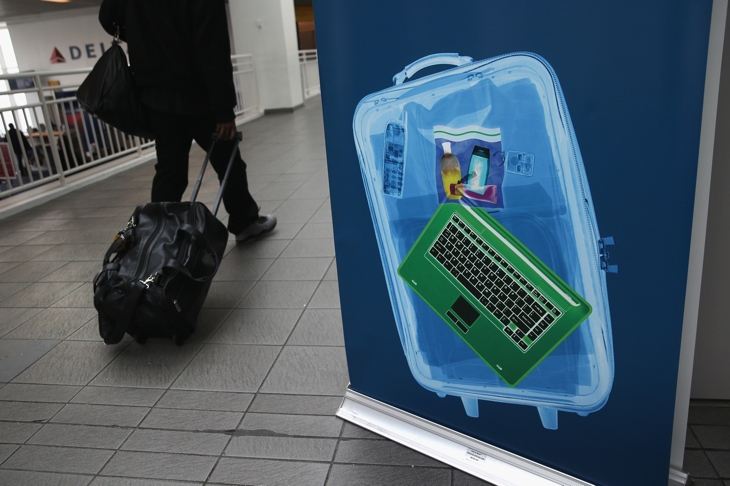First they came for your nail scissors, then your liquids, and now they’re after your electronics. The news this week that the US has banned passengers from taking laptops as carry-on onto flights from ten Middle Eastern airports has sparked horror among the global jet-setting community, which only intensified when the British government promptly followed suit. Smartphones will be allowed, but from now on if you’re travelling from the Middle East you’ll have to make do with an old-fashioned book rather than a kindle, iPad or laptop.
We are told that this is for ‘security’ reasons. According to US media sources, the ban was sparked by intelligence suggesting Islamic State has been developing ways to hide explosives in laptops. Just as the response to the 2006 plot involving liquid explosives was to ban everyone from carrying shampoo and bottled water onto planes, so the reaction to this potential threat has been to remove any devices that might make a long-haul flight bearable. For your own safety, of course. Who can complain about that?
Except there’s one detail about the US rules that doesn’t quite fit. The ban on large electronics only affects nine airlines, and notably excludes flights by US carriers. You can stay glued to your laptop for the entire duration of a flight from Doha to New York, as long as you’re flying with a US airline. This makes no sense at all. If IS terrorists really are plotting to hide explosives in laptops, wouldn’t they just book flights with US airlines?
I’m no conspiracy theorist, but I can’t help thinking of the bitterness that exists between American carriers and airlines from the Gulf, in particular Emirates, Etihad and Qatar Airways (all on the banned-laptops list). Put simply, the Gulf airlines are much, much nicer than anything United Airlines or Delta could ever hope to achieve. In terms of quality, comfort and customer service, US providers routinely fall short of basic competence, let alone the luxury offered by Emirates.
The US carriers claim the Gulf airlines are flush with government subsidies and don’t have to compete on the same terms, meaning they must be impeded at all costs. In 2015, the chief executives of American carriers lobbied to change the Open Skies agreement to restrict competition on US international routes and shut out Gulf challengers. (Nor is their antagonism towards foreign airlines limited to Arab oil states – lobbyists fought to keep air travel out of the proposed TTIP agreement with the EU, and low-cost European carriers like Norwegian Air have also come under fire.) Meanwhile, US airlines have been accused of high fares, poor service, and even price-fixing.
The most lucrative air travellers are business and first-class passengers who pay a premium for comfort – the kind of travellers, in other words, who might want to carry a laptop onto a plane and spend the flight working. With the new rules, the US government has effectively seized this market from its competitors, using the pretext of ‘safety’. They can’t compete for these customers in terms of service, so they are hampering what their rivals can offer instead. If that’s what’s going on, it is blatant protectionism, straight out of the Donald Trump campaign book on bringing back American jobs. And to hell with American (and international) air passengers.Interestingly, the British version of the ban does not make exceptions for UK airlines like British Airways and EasyJet. It is possible we take security more seriously than the Americans – but unlikely. Has Britain just dutifully followed America in its bid to curb the open air travel market? We should know better.
Rachel Cunliffe is the deputy editor of Reaction






Comments